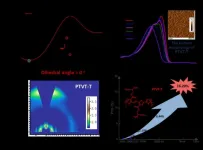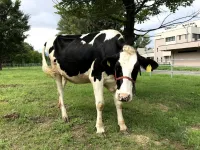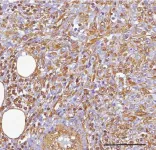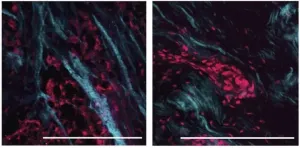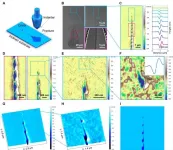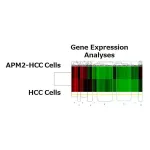COVID-19 survivors might need just one dose of two-part vaccine
Cedars-Sinai research involving more than 260 individuals supports earlier findings from small studies about efficacy of single vaccine dose for those with prior coronavirus infections; further study needed
2021-04-02
(Press-News.org) LOS ANGELES (April 1, 2021) -- A single dose of the Pfizer-BioNTech vaccine for individuals who previously had COVID-19 generates an immunologic response similar to that of individuals receiving the two-dose recommended sequence, according to a Cedars-Sinai study published today by the journal Nature Medicine.
"Our findings extend those from smaller studies reported elsewhere and support a potential strategy of providing a single dose of vaccine to persons with a confirmed prior history of coronavirus infection, along with two doses for people not previously infected," said Susan Cheng, MD, MPH, MMSc, associate professor of Cardiology and director of Public Health Research at the Smidt Heart Institute at Cedars-Sinai. "This approach could maximize the reach of a limited vaccine supply, allowing potentially millions more people to be vaccinated in the U.S. alone."
The vaccine that was studied, produced by Pfizer Inc. and BioNTech SE, normally is administered in two doses, 21 days apart, to provide nearly full protection against the novel coronavirus, known as SARS-CoV-2.
The Cedars-Sinai research strongly suggests the second dose may not be needed for individuals who have successfully recovered from a prior coronavirus infection.
"Overall, individuals who had recovered from COVID-19 developed an antibody response after a single vaccine dose that was comparable to that seen after a two-dose vaccination course administered to individuals without prior infections," said Kimia Sobhani, PhD, medical director of the clinical core laboratories and associate professor of Pathology and Laboratory Medicine at Cedars-Sinai. "It appears that a single booster dose given to previously infected individuals offers the same benefit as two doses given to people without prior infection." Sobhani and Cheng, along with Jonathan Braun, MD, PhD, professor of Medicine at the F. Widjaja Foundation Inflammatory Bowel and Immunobiology Research Institute at Cedars-Sinai, co-senior-authored this study.
For their research, the investigators administered surveys to 1,090 healthcare workers in the Cedars-Sinai Health System who had received the Pfizer-BioNTech vaccine. The surveys asked the workers about prior coronavirus infections and any symptoms they might have experienced after being vaccinated.
The healthcare workers also took antibody tests to gauge the response of their immune systems to the vaccinations. Antibody levels were measured at three points in time: before or up to three days after the first dose, within seven to 21 days after the first dose, and within seven to 21 days after the second dose.
Based on the surveys, the research team identified 35 individuals with prior coronavirus infections who had received a single vaccine dose and 228 individuals without prior infection who had received both vaccine doses. Based on the antibody tests, the team found that levels and responses of coronavirus-specific antibodies were similar in both of these groups.
Post-vaccine symptoms were more prominent for those with prior infection after the first dose, but symptomatology was similar between the two groups after the second dose.
The investigators said their study had limitations and that more research will be needed to confidently guide vaccine policy.
They noted that they measured antibody levels only up to 21 days following each vaccine dose and that longer-term follow-up likely would provide additionally informative data, especially regarding the duration of the immunity acquired from receiving a single versus double dose of the vaccine.
They also noted that even larger cohort samples will be needed to examine differences across demographic and clinical subgroups that are known to exhibit variation in antibody response following vaccination. More studies also are needed to determine if the results seen after a single dose of the Pfizer-BioNTech vaccine might also apply to other SARS-CoV-2 vaccines, they added.
INFORMATION:
The vaccine study and related research are part of the Coronavirus Risk Associations and Longitudinal Evaluation (CORALE) study conducted by a network of clinicians and scientists from multiple institutions, primarily in Southern California. The network receives support from the National Cancer Institute of the National Institutes of Health as part of the National Serological Sciences Network, an initiative to advance knowledge of immunology and COVID-19 in the U.S. Cedars-Sinai is one of eight institutions that have been awarded NCI grants to conduct multiple research projects for the initiative.
Funding: Research reported in this publication was supported in part by Cedars-Sinai, the Erika J. Glazer Family Foundation, the F. Widjaja Family Foundation, the Helmsley Charitable Trust, the National Institutes of Health under grant number K23-HL1538 and the National Cancer Institute of the National Institutes of Health under grant number U54-CA260591-01.
Competing interests: John C. Prosko, Edwin C. Frias and James L. Stewart work for Abbott Diagnostics, a company that performed the serological assays on the biospecimens that were collected for this study. The remaining authors have no competing financial interests.
Read more on the Cedars-Sinai Blog: mRNA Vaccines: An Explanation
[Attachments] See images for this press release:
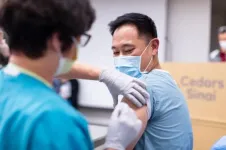
ELSE PRESS RELEASES FROM THIS DATE:
2021-04-02
Organic solar cell (OSC) is one of the most important green energy technologies. The photovoltaic efficiencies of OSCs are closely related to the photoactive layers, which are prepared by blending electron donor and acceptor materials. With the emergence of a large number of new organic photovoltaic materials and effective molecular modification methods, the photovoltaic efficiency of OSCs has been greatly improved. Accordingly, the molecular structure of the materials is becoming much more complex with high costs, which is difficult to meet the requirements of the industrialization of OSCs. Thus, it is of great importance to develop novel photovoltaic ...
2021-04-02
Scientists in Japan have developed and tested a novel probiotic formulation to control severe diarrhea in calves, ensuring their health and reducing mortality, and in turn reducing economic loss.
The health of calves is a crucial component in animal husbandry; diseases that affect calves cause economic losses to livestock farms either directly, due to death of the calves, or indirectly, due to weight loss that reduces productivity over the animals' lifespans. In Japan, bovine rotavirus (BRV) and bovine cryptosporidiosis infections are major diseases that cause severe diarrhea in calves.
A team of scientists from Hokkaido, including Associate Professor Satoru Konnai of the Faculty of Veterinary Medicine at Hokkaido University, have ...
2021-04-02
Researchers in Italy have identified a pair of microRNA molecules that help maintain a population of cancerous stem cells that drive the growth of breast cancers and initiate tumor relapse after treatment. The study, which will be published April 2 in the Journal of Cell Biology (JCB), reveals that targeting these microRNAs makes cancer stem cells more susceptible to some chemotherapies and could potentially improve the prognosis of patients with aggressive forms of breast cancer.
Many tumors contain a small population of cancer stem cells that initiate tumor growth and give rise to the various cell types found in tumors. Moreover, because cancer stem cells are often resistant to radio- and chemotherapies, they can survive and promote tumor ...
2021-04-02
Researchers at the University of California, San Francisco, have discovered that aggressive, triple-negative breast cancers (TNBCs) can evade treatment by reorganizing and softening the collagen matrix that surrounds the cancer cells. The study, which will be published April 2 in the Journal of Experimental Medicine (JEM), shows that the softer matrix activates a signaling pathway that promotes the cancer cells' survival, and suggests that targeting this pathway could enhance the effectiveness of chemo- and radiotherapy in TNBC patients.
TNBC is an aggressive type of breast cancer with worse survival rates than other forms of the disease. Because TNBC cells lack the HER2 signaling ...
2021-04-02
A team of researchers has identified several candidates for drugs against the coronavirus SARS-CoV-2 at DESY´s high-brilliance X-ray lightsource PETRA III. They bind to an important protein of the virus and could thus be the basis for a drug against Covid-19. In a so-called X-ray screening, the researchers, under the leadership of DESY, tested almost 6000 known active substances that already exist for the treatment of other diseases in a short amount of time. After measuring about 7000 samples, the team was able to identify a total of 37 substances that bind to the main protease (Mpro) of the SARS-CoV-2 virus, as the scientists report online today in the journal ...
2021-04-02
Glassy materials play an integral role in the modern world, but inherent brittleness has long been the Achilles' heel that severely limits their usefulness. Due to the disordered amorphous structure of glassy materials, many mysteries remain. These include the fracture mechanisms of traditional glasses, such as silicate glasses, as well as the origin of the intriguing patterned fracture morphologies of metallic glasses.
Cavitation has been widely assumed to be the underlying mechanism governing the fracture of metallic glasses, as well as other glassy systems. Up until now, however, scientists ...
2021-04-02
A new study indicates holes the solution to operational speed/coherence trade-off, potential scaling up of qubits to a mini-quantum computer.
Quantum computers are predicted to be much more powerful and functional than today's 'classical' computers.
One way to make a quantum bit is to use the 'spin' of an electron, which can point either up or down. To make quantum computers as fast and power-efficient as possible we would like to operate them using only electric fields, which are applied using ordinary electrodes.
Although spin does not ordinarily 'talk' to electric fields, in some materials spins can interact with electric fields indirectly, and these are some of the hottest materials currently studied ...
2021-04-02
In May 2020, a team led by thoracic surgeon Konrad Hoetzenecker of the Department of Surgery of MedUni Vienna and Vienna General Hospital performed a lung transplant on a 44-year-old patient who had been seriously ill with Covid-19, making her the first patient in Europe to receive a lung transplant for this indication. The Vienna lung transplantation programme now plays a leading role in an international consortium comprising experts from the USA, Europe and Asia. Based on the expertise from Vienna, approximately 40 transplants have now been carried out on Covid-19 patients throughout the world. In a study published in the leading journal ...
2021-04-02
Russian researchers have developed an inexpensive, safe, and reliable packed eggs surface disinfection technology. This technology helps to kill bacteria, including salmonella, on eggshells. Also, it allows growing broiler chickens with strong immunity to viral diseases. Packed eggs are disinfected with 50 nanoseconds (one billionth of a second) electron beam. Disinfection takes place in plastic containers. The description of the technology was published in Food and Bioproducts Processing.
"Disinfection of the packed eggs protects eggs from subsequent contamination during storage", said Sergey Sokovnin, a professor at Ural Federal University and Ural Branch of Russian Academy of Science. "We found out that 5 kGy is enough for disinfection. Such dose allows to ...
2021-04-02
Niigata, Japan - Cancer is the world's second deadliest disease which contributes towards the fatality of over 10 million people per year. Oncologists adopt a variety of treatment procedures to treat cancer cells. Among the different methods used to fight cancer, chemotherapeutic treatment is a prominent and well-adopted technique. It is a drug based method, wherein powerful chemical compounds are injected into the body to annihilate the malignant cells. Although these chemicals support the destruction of the cancerous cells, optimizing their dosage has always been a challenge to the medical ...
LAST 30 PRESS RELEASES:
[Press-News.org] COVID-19 survivors might need just one dose of two-part vaccine
Cedars-Sinai research involving more than 260 individuals supports earlier findings from small studies about efficacy of single vaccine dose for those with prior coronavirus infections; further study needed

